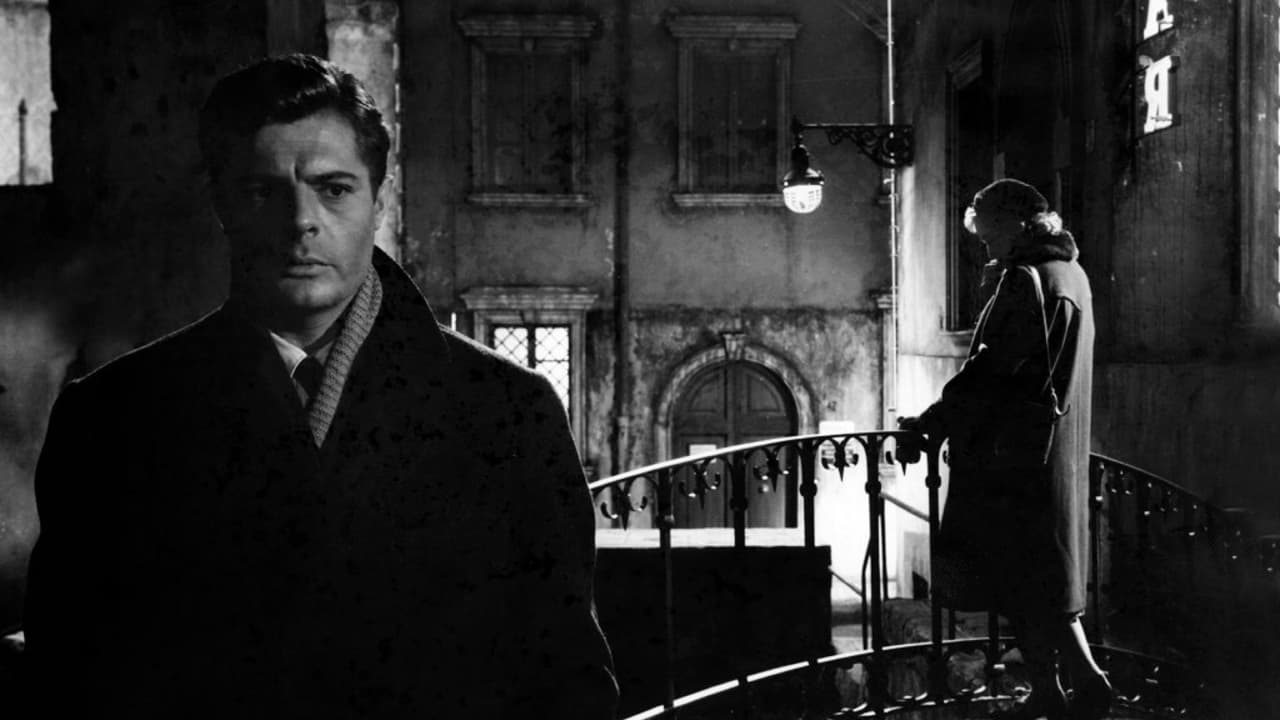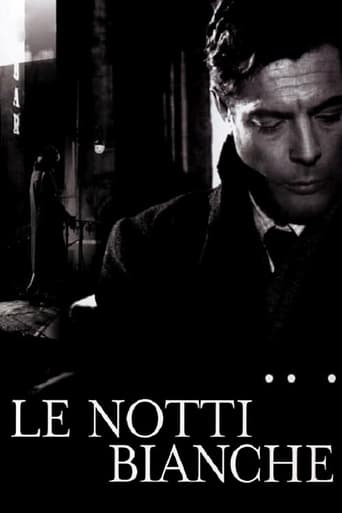SpuffyWeb
Sadly Over-hyped
BroadcastChic
Excellent, a Must See
Beystiman
It's fun, it's light, [but] it has a hard time when its tries to get heavy.
Ketrivie
It isn't all that great, actually. Really cheesy and very predicable of how certain scenes are gonna turn play out. However, I guess that's the charm of it all, because I would consider this one of my guilty pleasures.
lasttimeisaw
Visconti's cinematic adaptation of Dostoevsky's short story WHITE NIGHTS, LE NOTTI BIANCHE, transposed in an unspecified Venice-emulating town, but shot entirely inside the Cinecitta studio, signposts an emphatic deviance from his neorealism root, and emerges as a swooning melodrama centers on a bizarre love triangle.A johnny-come-lately to the town, the lonesome young man Mario (Mastroianni), alights on a similarly lonely young woman Natalia (Schell), who is waiting for the promised return of her lover (Marais), every night in the same place after their one-year separation. Mario is smitten with her in the first sight, and his good-natured persona slowly makes a reluctant Natalia relent, he is safe in her friend's zone, together she tells him how she falls head over heels for her beau, and every day she is tormented by the trepidation over the pending rapture or disillusion (an outcome totally out of her control), Mario's presence brings a ray of hope in her, and perhaps, she is able to reciprocate his affection, one day, when she will finally get over the man who deserts her.In this nocturnal fable, Visconti palpably husbands its stagey setting into a mist of yearning, melancholia and ambiguity, and on that vast canvas, Schell and Mastroianni enterprisingly emanate their characters' emotional gamut to the fore, an poignantly expressive Schell reifies the purest form of love's irrational wavelength, submerges herself into an almost trance-like whirlpool from which no one else but that man of her desire can extricate her; whereas an assiduous Mastroianni, outstandingly animates the diametrical switcheroo from delight to disenchantment of a man bewitched by an unrequited love, who bookends the film with a heart-rending resignation of the kismet as someone's second best.
To rationalize Natalia's out-and-out capitulation to her crush (and to resist an impeccably appealing Mastroianni), Visconti bestow a chiseled Marais a pall of mystique that is at once dangerous and scintillating, shorn of any contextual information (no name is referred), he is the emblem of a man's immanent appeal to the opposite sex; meantime, Clara Calamai's supporting turn as a desperate streetwalker is counterpoised as a biting undertow aiming at the gender and age discrimination in the milieu. Aesthetically, the infectious dancing-in-the-bar spectacle potently tempers the story's innate mawkish overtone and points up Visconti's ambidexterity in construction of both action and mood, a stylishly romanticized dissection of that senseless little thing called love.
Armand
lovely. for the actors. for the atmosphere of town. for the chain of fairy tales. for the spirit of Russian literary piece in the art/interpretation of a great Italian director. a love affair. meeting, carpet shop, two strangers, a young woman. and slices of talk, crumbs of expectations. and the beauty - fragile, charming, shy, poetic, cruel, ambiguous. a movie like many others. but with different soul. and steps. and art to present an ordinary story in nuances of myth. all is perfect. and full of grace. all is shadow of small people for who the other is the key for their life. all is fragile. because love is a difficult ladder. because a dance is more than mask of music. because past is just seed of each present gesture.
Lee Eisenberg
Luchino Visconti's adaptation of Fyodor Dostoyevsky's classic novel fits in perfectly with post-WWII Italy. Marcello Mastroianni and Maria Schell play people from dissimilar backgrounds who meet one night in an Italian town and strike up a relationship.An important aspect is their backgrounds. He has moved in from out of town, but has quickly gotten to know part of the town. While she has lived in the town her whole life, her grandmother has kept her close and never allowed her to see the other side of the town; she earlier struck up a relationship with another man (Jean Marais), but he left and she doesn't know whether or not he'll return. So then, Marcello Mastroianni and Maria Schell meet on the bridge (the link not only between the two sides of the town, but between the characters' different worlds).Another representation of contrasts between the separate worlds is shown by the different types of music. In one scene, Maria Schell and her grandmother go to see "Barber of Seville", one of the all-time classic operas. In the restaurant scene, someone plays a Bill Haley song, emblematic of modern music. Luchino Visconti was no fan of rock and roll, but probably felt that it would make for an evocative scene in this case.But anyway, "Le notti bianche" (or "White Nights") remains an important part of Italy's cinematic history. I hope to see more of Visconti's movie's in the future.
MisterWhiplash
Fyodor Dostoyevsky is a writer I've gotten into heavily recently, and I couldn't be happier to have seen Luchino Visconti's adaptation of his short story (not yet read by me) as the first. The very essential, human search for happiness with a one true love, that those who may not have much money may at least find some kind of relief from the world in each other's company, is at the heart of Dostoyevksy's stories. And while often filled with sorrow, decay, and with enough melodrama to sink a ship, this spirit is then given catharsis when the good that comes in through the dark times it's something to really cling to. Visconti has his own style already taking on Dostoyevsky's work, and I wondered going into it if the director of another great adaptation, Ossessione, could pull it off. For me, it may even be better than that film; Le Notti Bianche gives us characters who are not overly complicated or with nefarious desires. If anything, these are the kinds of characters that I wish were in movies more often, flaws and all.Marcello Mastroianni is also, for me, a really pleasant surprise seeing him in this film. Regrettably the only films I've seen him in are the early ones he made with Fellini, where his persona is cool, detached, and he could do his ultra suave &/or depressed and unchained characters effortlessly. With the character of Mario, Mastroianni is playing just an ordinary guy, with a low paying job and nothing special going for him in life. But if nothing else he is what most women in real life would look for in men, with compassion, sensitivity, but also sensible and with some of the minor flaws of being a nice guy. With the character of Natalia, Mario meets a woman whom he falls for hard, and wants to see again after a chance encounter. Maria Schnell is perfect against Mastroianni, as she has that kind of face and look in her eye (for lack of a better comparison) of any given American melodrama, only a bit more genuine. She's basically been waiting, as she tells, for a year for the man who will whisk her away from all of her troubles. But will he? Will Mario come through on a letter? What happens through the course of an unsure night? Visconti poises these two against a backdrop completely staged, brilliantly in fact, and shot by the great Giussepe Rotunno with the kind of visual splendor that in its own way is on par with Visconti's the Leopard. It's not filmed in the real world, and the melodrama in the film is that of a very cinematic- or maybe theatrical- nature, but because it's an ultimately believable one the atmosphere gets heightened. Topped with Nino Rota's elegant score, many a wide shot shows Mario and Natalia on their walks along the streets, and then the close-ups work just as well. Best of all is a quasi ice breaker of Visconti's by doing a dance number in a bar, adding a sweet, if dated, levity that acts as the last mark before the story turns, and turns some more. What drew me in most about Le Notti Bianchi is how Visconti makes this a story of pure emotions, but one that is not at all sappy or trashy or whatever. Like with many of Dostoyevsky's characters, even through their misguided wants and feelings and the sense of anguish that may come to them (or not), we care about them. If ever a director, who started in neo-realistic roots, took a 180 and made it just as dramatically satisfying, it's here. One of the best films of 1957.

